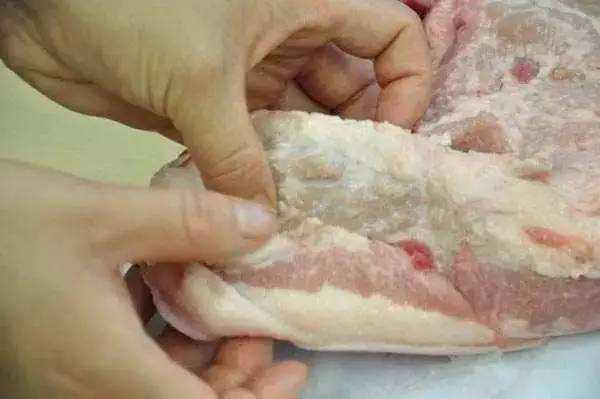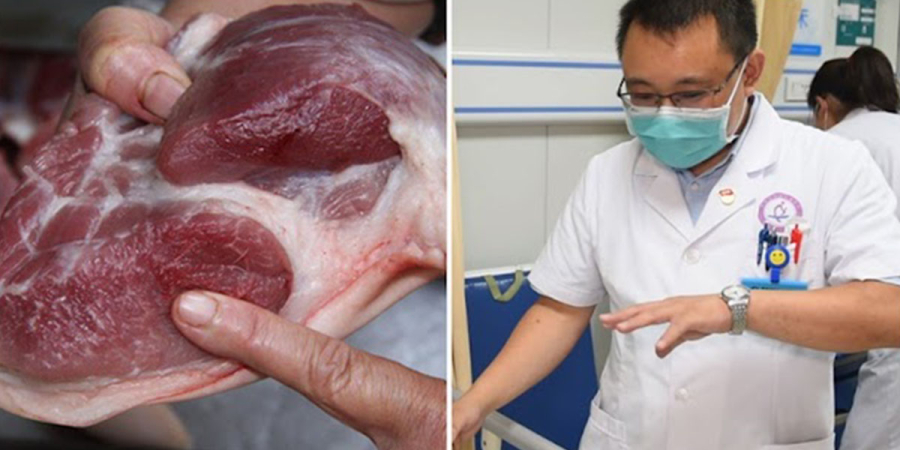Why experts advise people not to eat pig neck?
Dr. Luu Thanh Thanh (China Agricultural University) said: Pork neck is the dirtiest part of the meat, it is where the lymph nodes are located. Lymph nodes contain a large amount of white blood cells. These are cells that protect the body by eating harmful substances, bacteria, and dead cells. Therefore, it contains many bacteria, viruses, and germs.
The worrying thing is that these germs cannot be completely killed even when cooked at a temperature of 100 degrees Celsius. If consumed, it can easily cause infection. Not to mention, pig neck also contains the thyroid gland. This is the place where the hormone thyroxine is secreted. Consuming too much of this substance can disrupt metabolic processes. From there, it leads to the phenomenon of vomiting.

In addition, this hormone is very stable and difficult to destroy even when cooked at high temperatures. And no matter how it is processed, the hidden risk cannot be eliminated.
Moreover, the neck area is also an area prone to injection. Therefore, if unfortunately eating meat that still has residue of drugs, it will definitely cause many health consequences.
That’s why Dr. Thanh recommends: Although the neck meat is sold quite cheaply, you should not buy it, don’t bring diseases to the whole family just because it’s cheap.
In addition to not eating pig neck, you should also avoid the following mistakes after processing pork to avoid getting sick :
+ Frying, grilling:
Experts say: Cooking by frying, grilling is not good for health. Because high temperatures will produce harmful substances for health. Therefore, it is best to steam or boil, which will be beneficial for health.
+ Using frozen meat for too long:
Many families have the habit of buying in bulk and then packaging and storing in the refrigerator for later consumption. However, according to the recommendations of the US Ministry of Health, we should not keep poultry and especially live seafood in the refrigerator for more than 2 days. Processed meat should not be stored for more than 5 days.
The reason is that meat stored in the refrigerator for too long will cause bacteria to grow. At this time, the meat will lose nutrients and flavor.

+ Thawing incorrectly:
Food taken out of the freezer needs to be thawed before cooking. However, few people do this correctly. Soaking pork in hot or cold water for too long for thawing will cause nutrients to erode. Alternatively, leaving the meat to thaw at room temperature will cause bacteria to grow.
Experts say: Meat stored in the freezer needs to be naturally thawed for 2 – 3 hours before cooking. It is best to use cold water mixed with a little salt for quick thawing while retaining nutrients and ensuring hygiene. Or you can add some fresh ginger to the water when soaking the meat to make it fresh and delicious.
+ Washing meat with hot water:
Many people have the habit of rinsing pork before cooking. However, this will cause many nutrients in it to be lost. Pork muscle and fat contain a lot of protein. When hot water penetrates the pork, a large amount of this substance will dissolve. Therefore, you should use cold water to wash the meat.
Pork is indeed a common ingredient in today’s life. However, from the information on the newspaper, people should also have a proper perspective and make the right choices. Not all parts of pork can be eaten, be careful not to bring diseases into the body.
8 Common Mistakes People Make with Cutting Boards
Are you using your cutting board correctly? Many Vietnamese households rely on cutting boards in their kitchen, but not everyone knows how to use them properly, especially when it comes to wooden cutting boards. Check out these 8 mistakes to avoid when using a cutting board to ensure both hygiene and safety for everyone in your family.
Is Refrigerated Leftovers Linked to an Increased Risk of Cancer?
Dr. Lam Van Man, Head of Research, Development and Technology Transfer Department of the Institute of Safety Food, has warned of the risk of food poisoning when reheating leftovers from the refrigerator. But what should we be aware of when it comes to the possibility of these leftovers causing cancer? Here, we explore what the experts have to say on the matter and offer some tips for safe eating.





































